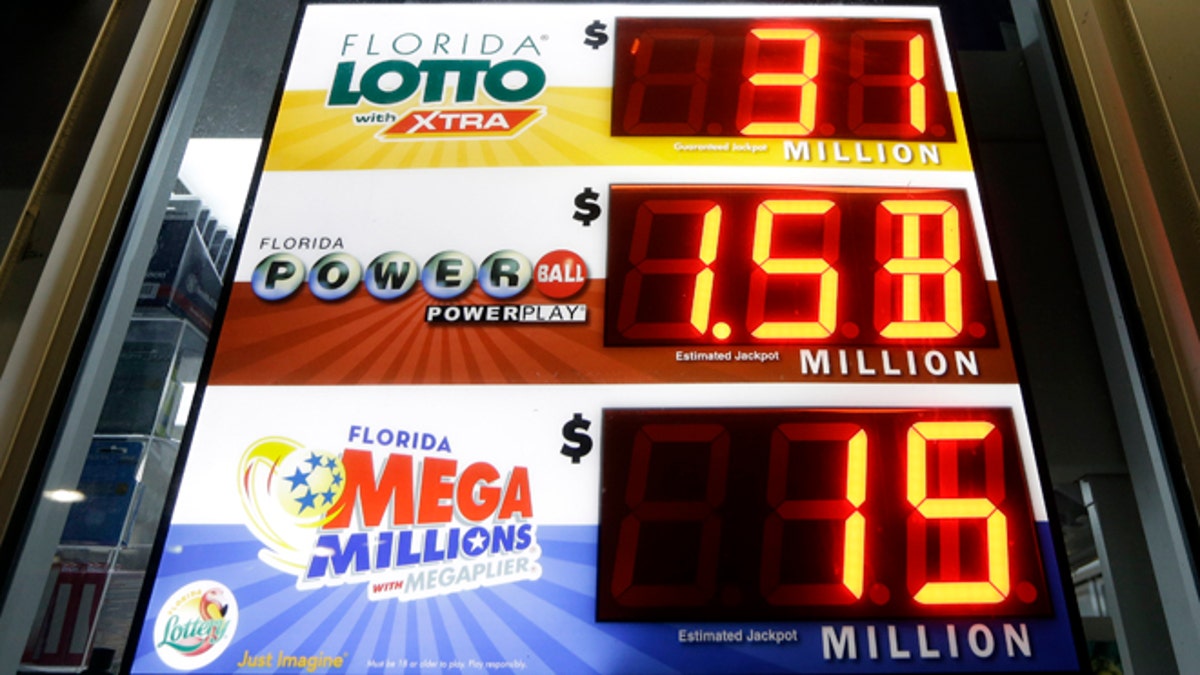
A sign shows the Powerball jackpot at a gas station Tuesday, Jan. 12, 2016, in Miami. The Powerball jackpot has grown to over $1 billion dollars for the next drawing on Wednesday. (AP Photo/Alan Diaz)
Officially, the odds of winning Wednesday night’s $1.5 billion Powerball jackpot are 1 in 292.2 million, or 0.00000034 percent.
That means that, statistically, there is a better chance of:
* Giving birth to identical quadruplets (1 in 15 million)
* Being killed by a falling vending machine this year (1 in 112 million)
* An Oscar winner being murdered in 2016 (1 in 138 million)
* Being struck by lightning and a meteorite in your lifetime (1 in 210 million)
Of course, if you buy 10 tickets those odds skyrocket to, well, 0.0000034 percent, which vaults your chances over all those occurrences except for the quadruplets.
Here are a few other things to keep in mind while you daydream about how to spend your winnings.
A person living in Rhode Island, South Dakota, Massachusetts, West Virginia or Delaware is likelier to win. That isn’t because of any nefarious advantage, but because people in those five states spend more money per capita on lotteries, according to the North American Association of State and Provincial Lotteries.
Six states don’t sell Powerball tickets — residents in Nevada, Utah, Mississippi and Alabama have to drive across a state border to buy tickets and, alas, poor Alaskans and Hawaiians need to blow serious money on plane fare just to get a chance.
Officials with the Multi-State Lottery Association, a group of state lotteries that oversee Powerball, said there is no geographic advantage.
"[It's] human nature to think the other guy is winning," Sally Lunsford, public affairs director for the Kansas Lottery, told the Associated Press.
It's also wrong, though there are anomalies.
For example, in the past two years, Missouri and Tennessee have each been home to three Powerball jackpot winners, while New York, the nation's fourth most populous state, has only had one winner during that span.
Wednesday’s $1.5 billion (and climbing) jackpot is nearly three times as large as the previous largest jackpot: the March 2012, $656 million Mega Millions bonanza split by three winning tickets.
The largest individual winner was Gloria Mackenzie of Zephyrhills, Florida, who had the only winning ticket in a May 2013, $590.5 million jackpot. The 84-year-old great-grandmother kept mum about her win for more than two weeks before showing up at the Tallahassee statehouse to collect her winnings.
There was an element of luck in her win beyond the 1 in 292.2 million.
“While in line, another lottery player was kind enough to let me go ahead of them in line to purchase the winning Quick Pick ticket,” Mackenzie wrote in a statement, before asking for people to respect her anonymity.
Mackenzie reportedly never returned to her single-story home in Zephyrhills, about 30 miles north of Tampa, that was across the street from a cow pasture.
Hopefully, she fared better than many of the other people who get large financial windfalls.
Take, for instance, William “Bud” Post, who was on disability in 1988 when he reportedly pawned a ring for $40 and used the money to buy Pennsylvania lottery tickets. He won $16.2 million which he used to buy an airplane, a mansion, a restaurant, a used car lot, a sailboat and a luxury camper.
The jackpot also led to a lawsuit, his brother hiring a hit-man to murder Post and his sixth wife, whom he later divorced, and bankruptcy. "Everybody dreams of winning money, but nobody realizes the nightmares that come out of the woodwork, or the problems," he said before he died penniless in 2006.
For Pedro Quezada of Passaic, N.J., who won the $338 million Powerball jackpot in March 2013, the problems weren’t entirely financial.
At the time of his win, he lived with girlfriend Ines Sanchez, and their child, but their estrangement led to a lawsuit (eventually settled) as well as arrest warrants for domestic violence and not paying child support.
Estimates of the number of people who go broke within five years of receiving a large financial windfall from a divorce, inheritance or lottery, range from 50 to 70 percent.
Don McNay, author of "Son of a Son of a Gambler: Winners, Losers and What to Do When You Win the Lottery," puts that number even higher, with nine out of ten winners blowing their winnings within five years.
"If you've never had the comfort of financial security before, if you were really eking out a living from paycheck to paycheck, if you've never managed money before, it can be really confusing," Paul Golden, of the Denver-based National Endowment for Financial Education, told the Associated Press.
"There's this false belief that no matter what you do, you're never going to worry about money again."
And if you're thinking that pooling money with your office mates gives you a better chance at the winning ticket, you're right. But it also seems to give you a better chance for litigation.
There are the Ohio cabinetry company workers who got sued by a fellow employee they cut out of a $99 million jackpot; the five construction workers who sued a sixth for withholding the $77 million winning ticket from their pool; and the Indiana hairdressers who claimed the same of a coworker who won $9.5 million.
Not to mention José Antonio Cua-Toc, an undocumented migrant from Guatemala, who in 2012 successfully sued Erick Cervantes, a Fort Valley, Georgia, resident, for his share of a payout. “Only in America can this sort of justice be done,” his attorney said after the jury decided in his Cua-Toc's favor.
But most people will put the potential pitfalls out of their minds and focus on this: $1.5 billion is about the amount of wealth in GDP of a small country like Belize.
